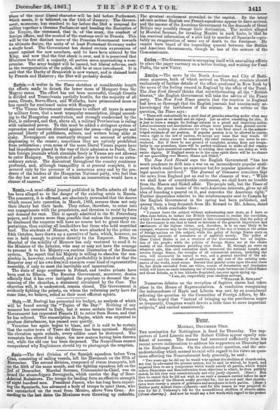lartrira.—The news by the North American and City of Balti-
more steamers, both of which arrived on Thursday, consists almost exclusively of further details of the effect produced in New York by the news of the feeling roused in England by the affair of the Trent. The New York Herald thinks that notwithstanding all the "British bluster," the English Government will take the advice of the Peace party. The New York Times asserts that the reaction in England had been so thorough that the English journals had unanimously ac- knowledged the lawfulness of the seizure. In an article on the question, the Times says: "There will undoubtedly be a good deal of genuine smarting under what may be looked upon as an insult and an injury. Let us allow something for this. ft is just to leave a margin for feelings natural to a proud and imperious nation. Local sentiments and associations are always more potent than general convic rions • but, making due allowance for this, we take final stand on the acknow- ledge rectitude of our position. If popular passion is to be allowed to contra- vene a right in the law of nations, we accept any issue that may result. Of course, the status cannot be restored; the rebel emissaries can never be sur- rendered. But if there be any ground of complaint, arising from any irregu- larity in our procedure, there will be perfect readiness to make all due repara- tion. We have committed ourselves to nothing that hinders our doing so with entire dignity. If England meets us in the same spirit there will be no chance of our quarrelling over Messrs. Mason and SlidelL" The New York Herald says the English Government "has too much prudence to drift into a war on an inconsiderate popular senti- ment which could have no existence but for popular ignorance of the legal question involved." The Journal of Commerce considers that the news from England put an end to the chances of war: "While we shall hear of considerable excitement, we shall have no trouble from the Mason and Slidell affair. The people talk, but the Times of London, the great leader of the anti-American interests, gives up all idea of founding a quarrel on it, and concedes the American right." Further despatches relative to the reinforcements sent to Canada by the English Government in the spring had been published, and among them a long despatch from Mr. Seward to Mr. Adams, dated July 21, which concludes thus: "I cannot leave the subject without endeavouring once more, as I have so often done before, to induce the British Government to realize the conviction, which I have more than once expressed in this correspondence, that the policy of the Government is one that is based on iuterests of the greatest importance and sentiments of the highest virtue, and, therefore, is in no case likely to be changed, whatever may be the varying fortunes of the war at home,or the action of foreign nations on this subject, while the policy of foreign States rests on ephemeral interests of commerce or of ambition merely. The policy of these United States is not a creature of the Government but an inspira- tion of the people; while the policies of foreign States are at the choice mainly of the Governments presiding over them. If, through an error on whatever aide, this civil contention shall transcend the national bounds and involve foreign States, the energies of all commercial nations, including our own, will necessarily be turned to war, and a general carnival of the ad- venturous and the reckless of all countries, at the cost of the existing com- merce of the world, must ensue. Beyond that painful scene upon the seas there lie, but dimly concealed from our vision, scenes of devastation and desolation which will leave no roots remaining out of which trade between the United States and Great Britain, as it has hitherto flourished, can ever again spring up.
"I am, sir, respectfully your obedient servant,
" WILLIAM H. SEWARD" Numerous debates on the reception of fugitive slaves had taken place in the House of Representatives. A. resolution recognizing the independence of Hayti and Liberia was met by an amendment referring the question to the Committee of Foreign Affairs, by Mr. Cox, who hoped that "instead of bringing up the pestiferous negro so frequently, Congress would devote a little time to more important subjects," and carried unanimously.




























 Previous page
Previous page